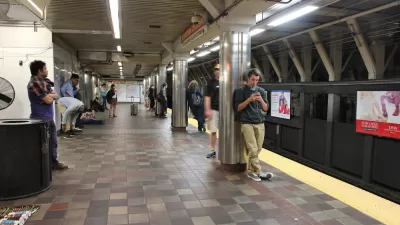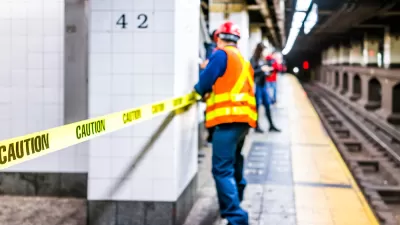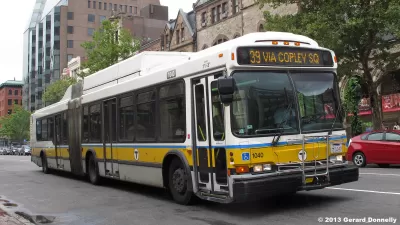A new estimate of how much it will cost to repair all of the infrastructure in the MBTA system places the price tag $3 billion higher than an estimate made only four years ago.

"The cost to fix or replace the MBTA’s aging equipment and upgrade to new, modern infrastructure is now valued at a cool $10 billion," reports Adam Vaccaro.
The newest figure is also " a dramatic jump from the already eye-popping estimate cited just four years ago," when the MBTA estimated the cost to repair the system's many capital assets at $7.3 billion. The figure includes the costs of maintaining and repairing "nearly all things transit," including "trains and buses, tracks and power systems, culverts and tunnels and bridges, and more," according to Vaccaro.
Much of the article, and the public relations messaging that has surrounded the announcement, is devoted to explaining the discrepancy between the 2015 figure and the 2019 figure:
The reason for the difference is that the latest review took a more in-depth look at various pieces of infrastructure, based on new federal standards. Also, it included costs that the prior number didn’t — such as the price of designing projects, upgrading infrastructure to include modern technology, and paying for bus diversions during major track work.
MBTA officials are also pointing out the improvements that have already been made, such as with the deployment of new buses in the system. "For example, a few years ago nearly three-quarters of the T’s vehicles were considered too old under federal standards. That number has since been reduced to 32 percent as hundreds of new buses have entered the system," writes Vaccaro.
FULL STORY: MBTA puts price tag for fixing the system at $10 billion

Study: Maui’s Plan to Convert Vacation Rentals to Long-Term Housing Could Cause Nearly $1 Billion Economic Loss
The plan would reduce visitor accommodation by 25% resulting in 1,900 jobs lost.

Alabama: Trump Terminates Settlements for Black Communities Harmed By Raw Sewage
Trump deemed the landmark civil rights agreement “illegal DEI and environmental justice policy.”

Why Should We Subsidize Public Transportation?
Many public transit agencies face financial stress due to rising costs, declining fare revenue, and declining subsidies. Transit advocates must provide a strong business case for increasing public transit funding.

Paris Bike Boom Leads to Steep Drop in Air Pollution
The French city’s air quality has improved dramatically in the past 20 years, coinciding with a growth in cycling.

Why Housing Costs More to Build in California Than in Texas
Hard costs like labor and materials combined with ‘soft’ costs such as permitting make building in the San Francisco Bay Area almost three times as costly as in Texas cities.

San Diego County Sees a Rise in Urban Coyotes
San Diego County experiences a rise in urban coyotes, as sightings become prevalent throughout its urban neighbourhoods and surrounding areas.
Urban Design for Planners 1: Software Tools
This six-course series explores essential urban design concepts using open source software and equips planners with the tools they need to participate fully in the urban design process.
Planning for Universal Design
Learn the tools for implementing Universal Design in planning regulations.
Smith Gee Studio
Alamo Area Metropolitan Planning Organization
City of Santa Clarita
Institute for Housing and Urban Development Studies (IHS)
City of Grandview
Harvard GSD Executive Education
Toledo-Lucas County Plan Commissions
Salt Lake City
NYU Wagner Graduate School of Public Service





























